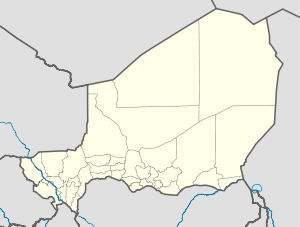Birni-N'Konni
|
Birni-N'Konni Konni |
|
|---|---|
| Location in Niger | |
| Coordinates: 13°47′30″N 5°15′00″E / 13.79167°N 5.25000°ECoordinates: 13°47′30″N 5°15′00″E / 13.79167°N 5.25000°E | |
| Country |
|
| Region | Tahoua Region |
| Department | Bkonni Department |
| Elevation | 270 m (890 ft) |
| Population (2008) | |
| • Total | 57,000 |
Birni-N'Konni (also Birnin-Konni or shortened to Konni/Bkonni) is a town in Niger, lying on the border of Nigeria and the Kori River. It is an important market town and transport hub and the 2001 census had a population of 44,663. The town is the historic centre of the small pre-colonial Hausa state of Konni. The name is Hausa language for "Walled Town of Konni", and many Hausa towns (such as Zinder) designate the old citadel neighbourhood the "Birni".
Konni is known for its vernacular architecture including traditional granaries and is regarded as a centre for smuggling between Niger and Nigeria, in which some suburbs of the town are officially located. Birni-N'Konni's contemporary importance rests on the surrounding agricultural lands and its place on the N1 highway, the main east-west highway linking Niger's capital Niamey and the nation's main eastern cities of Maradi and Zinder. It also sits astride one of several main routes between the Hausa populated territories of southern Niger and northern Nigeria, with the Nigerian transport and trade centre of Illela, Sokoto State just 18 km to the south.
The town was also the site of a major on 8 May 1899 when the French Voulet–Chanoine Mission attacked the region.
...
Wikipedia

